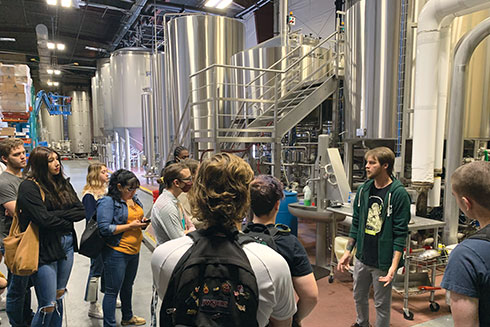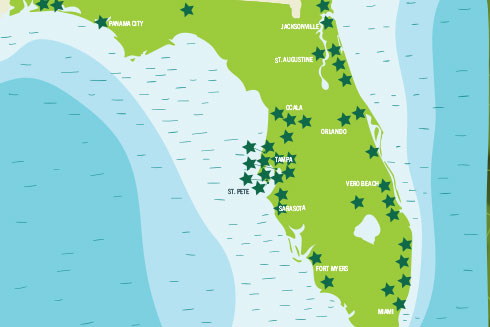By Georgia Jackson, University Communications and Marketing
When Joe Askren, a professor of instruction in the School of Hospitality and Tourism Management on the Sarasota-Manatee campus, sat down to develop a “hands-on” beer science course with then-colleague Kenneth Caswell, he worried they might be in over their heads.
The year was 2013 and the goal was simple: Introduce students to the science of beer, the brewing process, food pairing and brew pub operations. But, to make the course an experiential learning success, Askren knew they would need to partner with a local brewery.
“We were kind of nervous about getting connected and having one of the local breweries adopt us,” said Askren, who also wondered whether student demand would be sufficient to justify the course.
While recent legislation reducing restrictions on non-standard container sizes and allowing breweries to operate taprooms and sell beer directly to consumers for off-site consumption had created substantial growth in the number of brewpubs and craft breweries across the state, the local craft industry was still relatively young, and the number of breweries in the state remained in the double digits.
A decade later, any initial concerns Askren had about the success of the course have long since vanished, and 2013 may very well have been, as the Tampa Bay Times put it, “the year craft beer took over Tampa Bay.”
The number of craft breweries and brewpubs in the state has more than tripled since 2013, to 396. Together, they produce over one million barrels and create over $4 billion in economic impact each year. And, while beer sales across the country have declined slightly in recent years, sales of craft brews now account for 24.6% of the $115 billion U.S. beer market.
“We were worried about getting one local brewery, and we actually ended up having five or six that we toured with,” said Askren, who routinely takes his students behind the scenes at breweries, including Big Top Brewing Company, Calusa Brewing, Coppertail Brewing Co., Motorworks Brewing, Green Bench Brewing Company and others in Sarasota, Manatee, Pinellas and Hillsborough counties.
“To this day, the industry support is unbelievable.”
Class in a glass
In addition to touring breweries, students who enroll in Askren’s course — titled Introduction to Beer Science (HFT 3864) — attend lectures and brew two all-grain beers from scratch in the brewing lab on the Sarasota-Manatee campus. Once the beer is brewed, Askren teaches his students about conditioning, carbonating, packaging and marketing. Their final projects take various forms, from studies of beer trends to research on the third-party distribution system.
Former student Kyle Troupe called it “the best class” he had ever taken. “The amount of chemistry that goes into brewing beer is astounding,” he said. “If you even use a different water source it can drastically change the flavor of the final beer.”
Askren revamped the course last year by partnering with Priscila Veiga dos Santos, a professor of food science at the Universidade Estadual Paulista in São Paulo, Brazil, for an ongoing virtual global exchange. Students in Askren’s course now collaborate with students in Veiga dos Santos’ Industrial Fermentation Processes class. The Brazilian students serve as consultants, providing recommendations for how to modify and enhance the USF students’ recipes and produce a more robust final product.
“They have way more knowledge on these processes than I do,” said Pedro Abdo Breviglieri Nader, a former USF student. “It was very interesting to see how deep you can go in the subject.”
For Askren, watching students’ enthusiasm and confidence grow over the course of the semester is the best part.

Students touring Coppertail Brewery
“You have these students who come in, they know nothing about brewing, and some of them are excited, some of them are a little intimidated but want to learn about it. A couple of them don’t even really like beer,” said Askren, who credits his background in hospitality to the course’s success. “And it’s funny — by the end of the semester, some of those students are ordering equipment on Amazon. They stay hungry after the class is over. That’s why I love teaching it.”
One former student, Susie Bennett, went on to work for Motorworks Brewing as a microbiologist and quality assurance analyst. Both Nader and Troupe indicated they planned to invest in home brewing kits when the semester ended.
“Joe does a great job of keeping everything seem doable in a way that I feel like I could do it at home,” Nader said.
In an effort to meet increasing student demand, course capacity was doubled, last year, from 20 to 40 available seats, and there are plans to develop a hands-on lab to accommodate a certificate-based brewing program on the Tampa campus. The university has also launched a 23-week online brewing arts program, unaffiliated with the School of Hospitality and Tourism Management, on the St. Petersburg campus.

